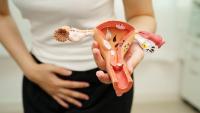Marni Sommer, DrPH, MSN, RN
- Professor of Sociomedical Sciences

Overview
Academic Appointments
- Professor of Sociomedical Sciences
Administrative Titles
- Menstrual Health & Gender Justice Working Group Member, Center for the Study of Social Difference
Credentials & Experience
Education & Training
- BS, 1994 University of Pennsylvania
- BS, 1999 Johns Hopkins University
- MS, 2001 Johns Hopkins University
- MPH, 2001 Johns Hopkins University
- DrPH, 2008 Columbia University
Committees, Societies, Councils
Member, Global Health Council, 2001- 2009
Member, Comparative and International Education Society, 2009 - 2011
Editorial Boards
Global Public Health
Honors & Awards
Doctoral Dissertation with Distinction, 2008
Marisa de Castro Benton Award for Outstanding Dissertation in Sociomedical Sciences, 2008
Award for Excellence in Global Health for a Doctoral Student, 2008
The Johns Hopkins Nurses' Alumni Association Award, 1999
Research
Research Interests
- Child and Adolescent Health
- Community Health
- Global Health
- Maternal and Reproductive Health
Selected Publications
Sommer, M., Torondel, B., Hennegan, J., Phillips-Howard, P.A., Zulaika, G., Mahon, T., Gruer, C., Motivans, A., MHHM Measures Group, Caruso, B.A. (2021) Monitoring Menstrual Health and Hygiene Group, Caruso, B.A. How addressing menstrual health and hygiene enables progress across the Sustainable Development Goals. Global Health Action, 14(1): DOI: 10.1080/16549716.2021.1920315
Sommer, M., Gruer, C., Smith, R., Maroko, A., Hopper, K. (2020) Menstruation and homelessness: Challenges faced living in shelters and on the street in New York City. Health and Place, 66, 102431.
Sommer, M., Parker, R.G., Msacky, G., Kajula, L., & Kaaya, S. (2019) How alcohol, space and time influence young people’s sexual encounters in Tanzania: A qualitative analysis. Archives of Sexual Behavior, 48(6): 1847-1857.
Sommer, M., Schmitt, M., Ogello, T., Mathenge, P., Marki, M., Clatworthy, D., Khandakji, S., & Ratnayake, R. (2018) Pilot testing an evaluation of a toolkit for integrating menstrual hygiene management in three refugee camps in northwest Tanzania. Journal of International Humanitarian Action, 3(1).
Sommer, M., Figueroa, C., Kwauk, C., Jones, M., & Fyles, N. (2017) Attention to menstrual hygiene management in schools: An analysis of education policy documents in low- and middle-income countries. International Journal for Educational Development, 57, 73-82.
Sommer, M., Caruso, B., Mahon, T., Zients, S., Jones, M., & Phillips-Howard, P. (2017) Beyond menstrual hygiene: Addressing vaginal bleeding throughout the life course in low- and middle-income countries. BMJ Global, Online July 27, 2017.
Sommer, M., Hirsh, J.S., Nathanson, C. & Parker, R. (2015) Comfortably, safely and without shame: Defining menstrual hygiene management as a public health issue. American Journal of Public Health. 105(7): 1302-1311.
Sommer, M., Sutherland, C. & Chandra-Mouli, V. (2015) Putting menarche and girls into the global population health agenda. Reproductive Health, 12(24).
Sommer, M., Likindikoki, S., & Kaaya, S. (2015) "Bend a fish when the fish is not yet dry": Adolescent boys' perceptions of sexual risk in Tanzania. Archives of Sexual Behavior, 44(3): 583-595.
Sommer, M. & Sahin, M. (2013) Overcoming the taboo: Advancing the global agenda for menstrual hygiene management for schoolgirls. American Journal of Public Health, 103(9): 1556-1559.
Global Health Activities
The Girls and Boys Puberty Book Project, Tanzania, Ghana, Cambodia, Laos, Ethiopia, Madagascar, Pakistan, Kenya: A project focused on developing, publishing, evaluating and distributing girls' and boy's puberty books aimed at 10-14 year olds. Provides basic guidance to girls on menstruation and body change, and to boys on puberty changes and peer pressures. Books published in Tanzania, Ghana, Cambodia, Laos, Ethiopia, Madagascar, Pakistan, Kenya, Sierra Leone and the US, and over two million hard copies disseminated. Formative research underway in partnership with CODE/Sierra Leone and TALLE to explore the use of teacher training guide to deliver the Sierra Leone girl's and boy's puberty books.
Menstruation and Humanitarian Contexts: Over 26 million girls and women are displaced around the world, many of whom struggle to manage their menstruation safely, comfortably and with dignity. In many emergency contexts, menstruating girls and women face inadequate access to safe and private toilet and bathing facilities, culturally appropriate menstrual materials and supplies and menstrual health and hygiene information. The GATE program supports a range of menstrual hygiene management (MHM) in emergencies projects globally in partnership with the International Rescue Committee and other humanitarian partners, United Nations agencies and researchers.
Period Posse Presents Webinar Series: This monthly interactive webinar series brings together experts in menstrual health and hygiene from across research, policy and practice in the U.S. and around the world to discuss key emerging issues.
Structural Approaches to Youth Alcohol Use and HIV Risk in Tanzania, Tanzania: An NIH funded study conducted with the Muhimbili University of Health and Allied Sciences (MUHAS) aimed at exploring adolescent alcohol use in the context of a new national alcohol policy in Tanzania. The qualitative and participatory research with adolescent girls and boys, and the adults in their lives, sought to better understand the accessibility, affordability and availability of alcohol to youth in urban Tanzania, and the subsequent risky sexual behaviors in which they engage in after drinking alcohol.
Urban Health Activities
Menstruation and Homelessness: In 2018, we initiated a mixed methods research program in collaboration with the CUNY Graduate School of Public Health and Health Policy and the New York Coalition for the Homeless. Our first project under this initiative explored how well this population is able (or not able) to manage their periods, including accessing sanitation facilities and menstrual hygiene products, and how – short of re-housing – their needs could be more effectively addressed.
Menstruation and U.S. Adolescent Girls: In 2018, we started the Growing Girls USA Program to examine the menstruation and puberty experiences of low-income adolescent girls growing up in America's three largest cities: Los Angeles, Chicago and NYC. We used participatory and qualitative methods to collect insights and learning from girls and adults in their lives. We also collected first period stories from girls across the United States, and developed the book "A Girl's Guide to Puberty & Periods" in addition to a series of publications highlighting research findings.




